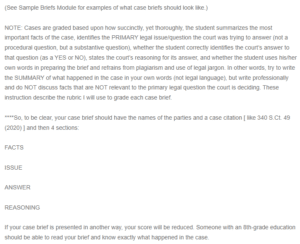Dobbs vs Jackson Women’s Health Organization
CASE BRIEF
Thomas E. Dobbs, State Officer of the Mississippi Department of Health et al., Petitioners v. Jackson Women’s Health Organization No. 19-1392, 597 U.S._ (2022).
FACTS
The case entailed Mississippi’s Act on Gestation Age, passed in 2018. The Act made it illegal to have abortions done beyond 15 weeks, excluding medical emergencies and severe fetal abnormalities. Further, the Act provided punishments for any provider of abortion services, such as license suspension. As a result of the Gestation Age Act, Jackson Women’s Health Organization filed a lawsuit to challenge the Act’s constitutionality. The petitioner in the case was a Mississippi State Health officer called Thomas Dobbs. Thomas Dobbs filed a petition that was granted for certiorari (Aieken et al., 2022). The query of whether all pre-viability bans on elective abortions were unconstitutional was given to writ by the Supreme Court for assessment.
ISSUE
Dobbs represented Mississippi and argued that no provision in the constitution provides for the right to abortion. Further, he argued that states were at liberty to ban abortions if they were deemed rational and in line with legitimate state interests. The text of the Tenth Amendment provided a basis for Mississippi’s prohibition decision. In the argument, Mississippi added that the word “liberty”, as given in the Fourteenth Amendment, is restricted to fundamental rights which have a foundation in U.S. tradition and history. The argument excluded abortion from fundamental rights because, at the time of the case, bans on abortion had been ratified by many states. Also, Mississippi debated that the “viability line” was too subjective and arbitrary to prevent a state from protecting its interests.
In contrast, Jackson’s Women’s Health Organization contested that the Fourteenth Amendment protected the right to abortion. The organization argued that physical autonomy and body integrity formed crucial components of liberty enshrined in the due process clause, providing an example of the word “contraception” comprising liberty. Further, Jackson’s Women’s Health Organization argued that individuals’ right to possess their bodies or the right to abortion is a crucial aspect of the common law. Instances in which the viability line has been applied uniformly by federal courts were also cited in the argument.
ANSWER
- Abortion was not awarded a fundamental right status, and states could proceed to regulate it for legitimate reasons.
REASONING
The central question in the decision was related to whether the Constitution was correctly understood regarding the right to abortion. The court identified no express references to abortion in the constitution and that the sex-based classification of abortion is not tied to the court precedent on abortion state regulation. Also, the court noted that the issue of abortion should not be linked to the country’s traditions and history. Abortion at any stage of pregnancy was substantially a crime in many states when the Fourteenth Amendment was adopted, which was valid until the case of Roe v. Wade came in (Coverdale et al., 2023). Thus, there is no way that abortion could be considered a fundamental right acquiring its origins in the country’s history and traditions such as “liberty”, noting that in the case of Roe v. Wade, history could have been ignored or misstated. Further, the court noted that people from different states could evaluate the interests between a woman needing an abortion and a potential life. Lastly, the court provided that abortion was not part of an entrenched right and its licensing could give rise to the licensing of prostitution and illicit drug use. Thus, states could regulate abortion for legitimate reasons.
References
Aiken, A. R., Starling, J. E., Scott, J. G., & Gomperts, R. (2022). Requests for self-managed Medication abortion were provided online telemedicine in 30 U.S. states before and after the Dobbs v Jackson Women’s Health Organization decision. JAMA, 328(17), 1768-1770.
Coverdale, J., Gordon, M. R., Beresin, E. V., Guerrero, A. P., Louie, A. K., Balon, R., … & Brenner, A. M. (2023). Access to Abortion after Dobbs v. Jackson Women’s Health Organization: Advocacy and a Call to Action for the Profession of Psychiatry. Academic Psychiatry, 47(1), 1-6.
ORDER A PLAGIARISM-FREE PAPER HERE
We’ll write everything from scratch
Question

Dobbs vs Jackson Women’s Health Organization
(See Sample Briefs Module for examples of what case briefs should look like.)
NOTE: Cases are graded based upon how succinctly, yet thoroughly, the student summarizes the most important facts of the case, identifies the PRIMARY legal issue/question the court was trying to answer (not a procedural question, but a substantive question), whether the student correctly identifies the court’s answer to that question (as a YES or NO), states the court’s reasoning for its answer, and whether the student uses his/her own words in preparing the brief and refrains from plagiarism and use of legal jargon. In other words, try to write the SUMMARY of what happened in the case in your own words (not legal language), but write professionally and do NOT discuss facts that are NOT relevant to the primary legal question the court is deciding. These instruction describe the rubric I will use to grade each case brief.
****So, to be clear, your case brief should have the names of the parties and a case citation [ like 340 S.Ct. 49 (2020) ] and then 4 sections:
FACTS
ISSUE
ANSWER
REASONING
If your case brief is presented in another way, your score will be reduced. Someone with an 8th-grade education should be able to read your brief and know exactly what happened in the case.


